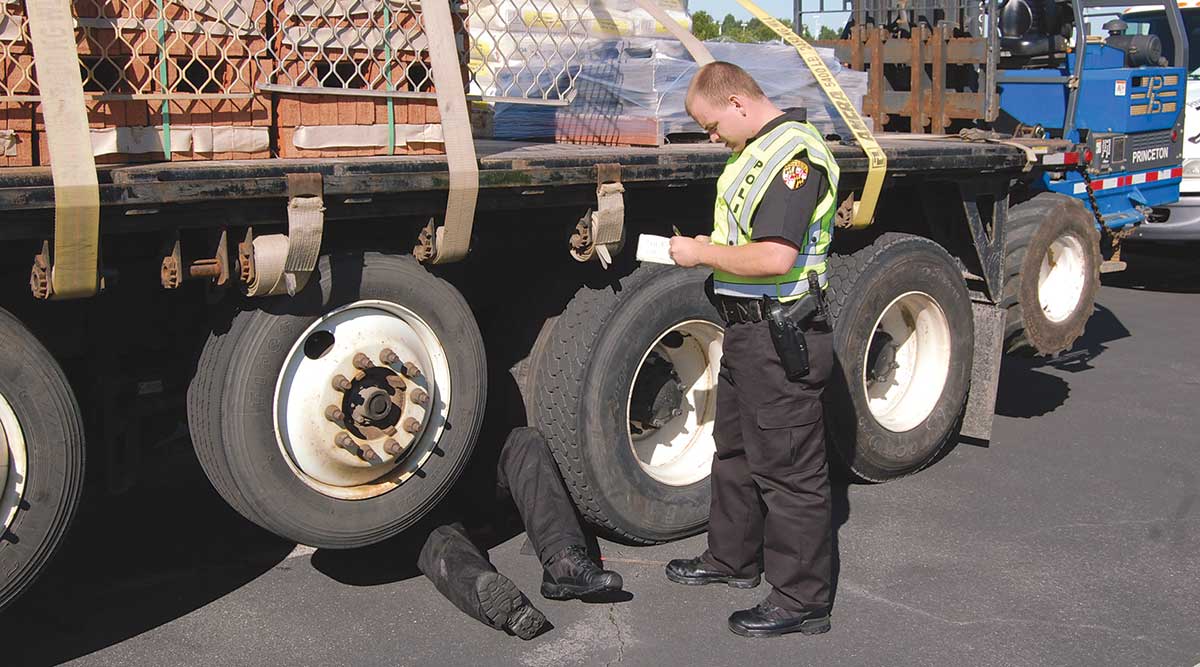Senior Reporter
CVSA Gears Up for 30th Annual Roadcheck

This story appears in the May 29 print edition of Transport Topics.
Will Schaefer, director of safety programs for the nation’s top commercial vehicle inspectors group, has some advice for motor carriers whose trucks will be on the road June 6-8: Make sure that your maintenance programs are keeping up with your vehicles and remind your drivers to keep their log books current.
During those dates, state and federal inspectors in the United States, Canada and Mexico will be conducting more than 60,000 heavy-truck and bus inspections during 72 hours of stepped-up enforcement.
This year marks the 30th anniversary of Roadcheck, an annual Commercial Vehicle Safety Alliance event that in 2017 will feature an emphasis on cargo securement compliance.
Inspectors primarily will be conducting North American Standard Level I Inspections, the most thorough conducted on the roadside. It’s a 37-step procedure that includes an examination of driver operating requirements and vehicle mechanical fitness.
Drivers are required to provide items such as their driver’s license, hours-of-service documentation, motor carrier registration and shipping documentation. Inspectors also will be checking drivers for seat belt usage and the influence of alcohol and/or drugs.
CVSA said the vehicle inspection includes the brake systems, cargo securement, coupling devices, driveline/driveshaft, exhaust systems, frames, fuel systems, lighting devices (required lamps), steering mechanisms, suspensions, tires, van and open-top trailer bodies, wheels, rims and hubs, and windshield wipers.
On average, 17 trucks or buses will be inspected every minute during the 72-hour period.
Since its inception, more than 1.5 million roadside inspections have been conducted during the event, which will include stepped-up traffic enforcement as patrol officers pull over commercial vehicle drivers displaying dangerous habits behind the wheel.
State troopers also have been known to patrol highways that truckers may use to avoid inspection areas, Schaefer told Transport Topics.
The CVSA program will include participation by the U.S. Federal Motor Carrier Safety Administration, Canadian Council of Motor Transport Administrators, Transport Canada and the Secretariat of Communications and Transportation in Mexico.
“It allows us to re-emphasize and reinforce roadside enforcement and makes people aware of the regulations,” Schaefer said.
Although he said CVSA sometimes is criticized for publicizing the event, the bottom line is that it alerts carriers to fix trucks that have maintenance problems, potential violations or defects.
That’s not to say that some truckers won’t take a chance; not all vehicles in a long line will be checked by inspectors keying off license plates or DOT numbers to look for carriers with less-than-stellar records. Others may be chosen for inspection based on an obvious problem such as a flat tire or for displaying erratic behavior.
“There are always those who don’t worry about what’s coming and perhaps don’t worry about the condition of their vehicles,” Schaefer said.
Last year, 62,796 inspections were conducted during the international enforcement campaign, of which 42,236 were Level I inspections. Of Level I inspections, 21.5% of vehicles and 3.4% of drivers were placed out of service due to critical violations, CVSA said.
Of vehicles placed out of service, brake adjustment and brake system violations combined to represent 45.7%. The top driver out-of-service violations were for hours of service and false logs, representing 46.8% and 16.4%, respectively.
Although some states will stage their own Roadcheck kickoff events, this year CVSA will not put on a national ceremony as in past years, Schaefer said.




